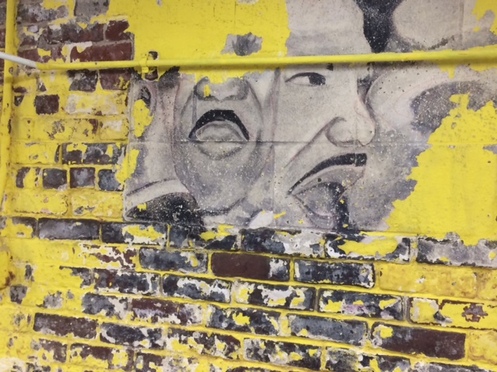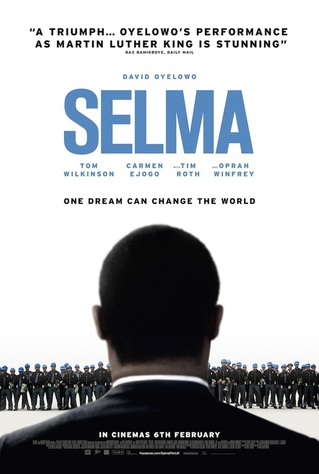|
Author: Cambridge Community Center youth and youth workers On January 19, 2015 a small group from Cambridge Community Center went to go see the movie ‘Selma.’ The plot was astonishing, depicting an lesser known battle of the Civil Rights Movement. Some of the scenes displayed gruesome images, and the overall message was clear: it had been a trying and, at times, tragic slog towards achieving equality. Seeing the elderly brutally beaten numerous times left a rancid taste in the mouths of both myself and my peers. ‘Selma’ was not an easy movie to watch, but it did come across as an important one to see. “‘Selma’ was an inspirational and enlightening movie,” said one of the audience members as he reflected on his viewing experience as we rode home from the theater. Prior to seeing the movie, we’d all had small conversations about what we’d heard, seen, and thought about the movie. Some people had seen the trailer and some people knew very little. With expectations extremely high, the film blew us away in unexpected ways. Mixed emotions flew all over the place as the movie progressed. Tears were shed and giggles were quivered as the movie solemnly progressed. “The movie made me think about how people had suffered for their rights,” said another youth after seeing it. On the bus ride home, many voices spoke over each other about their feelings. No one was untouched by what they had seen, and the movie had everyone thinking about the current racial climate. It was impossible to not connect the Civil Rights movement of the past with the civil rights violations of today. Was it worth it, what Martin Luther King Jr. and his followers had fought for? Did they succeed in attaining their goals? ‘Selma’ is not a movie to be taken lightly. It’s subject is serious and it’s viewpoint unwavering. For all those who see it, it is will be eye opening and unsettling but essential and unforgettable as it was for us. -Cambridge Community Center youth and youth workers This is a Martin Luther King Jr. mural uncovered in our art room last year:And a poster for the film:Afterword from Executive Director Corinne Espinoza:
Thanks to a generous donation from area African American business leaders, the Cambridge Community Center was able to take a group of 14 to see Selma on Dr. Martin Luther King, Jr. Day. Our group had middle schoolers, high schoolers, a first year college student, their teachers and youth workers. The movie was powerful and difficult to watch. While we know the troubled history of our country, seeing it on the big screen was still startling and elicited reactions ranging the gamut from grief and anger to hope. Led by Kwame Dance, a CCC Board Member and the Director of the Moore Youth Center, we held a debrief with the group afterwards. We went from one word reactions about the movie to making connections between the past and the present. We talked about the future that we want. Our youth talked about racism and inequalities that exist today and discussed what it meant to be a change maker. We ended our talk with a group of youth fired up to talk to the Cambridge City Council about what could be better in our City. Thank you donors, for helping us use art as a tool for social change.
0 Comments
Author: Darrin Korte, Director of Out-of-School Time Programs, The Hip Hop Transformation Program Director
From its inception, hip hop music and culture has represented the voice of a movement. The descendant of spirituals, jazz, blues, and rock, hip hop has evolved through constant innovation to become arguably the most passionate art form in our society today. While many people only think of rap music when they think of hip hop, hip hop culture takes the form of many different genres such as dance, graffiti, DJaying, and fashion. At its core, hip hop still carries this history and message of unity with it. However, due to many outside forces and influences, hip hop has developed an image as being hyper violent, misogynistic, and anti social leading many to believe that hip hop is a negative influence on the youth who consume it. Author: Darrin Korte, Director of Out-of-School Time Programs, The Hip Hop Transformation Program Director
Last year I was lucky enough to be awarded a grant to run the program of my dreams at the Cambridge Community Center. It was a program that would combine my three biggest passions – social justice, youth work, and hip hop culture. The program was designed to teach teens in the Cambridge area about the history of hip hop culture and the role that it plays in their lives. Then we would teach them the art of hip hop music – how to write, record, and perform their own original music. Through this process we would develop conscious consumers who better understood the messages in the music they were listening to. We would develop teens that were comfortable exploring their talents and showcasing them in front of their community. We would combat the negative images often associated with hip hop music with the positive spirit that hip hop grew from. We would demystify the art of lyric writing and make this form of expression accessible to all of the program participants. We would connect them to positive role models in the local hip hop community. Through knowledge and experience we would inspire a transformation in the teens. The Hip Hop Transformation was born. Author: Sarah Saydun, Cambridge Community Center Development Associate
In a recent interview on NPR, Dr. Daniel Siegel, a psychiatrist and Center for Culture, Brain, and Development at UCLA, stated that adolescent struggles are more than just raging hormones, they stem from a remodeling of the brain that makes them completely change. It made me reflect on what it was like to be that age – overwhelmed with stress from school, my family, my peers, and struggling to navigate all of the changes going on within myself. My mom used to tell me “don’t worry, high school won’t last forever”, half kidding, but fully empathizing, remembering her adolescent experience and the struggles she went through as an awkward teen trying to fit in. |
Archives
April 2018
Categories
All
|



 RSS Feed
RSS Feed